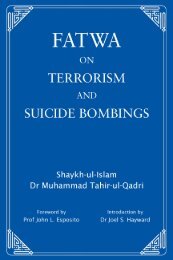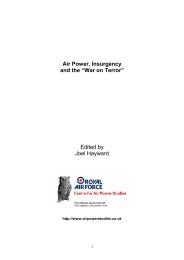Air Power, Insurgency and the âWar on Terrorâ - Prof. Joel Hayward's ...
Air Power, Insurgency and the âWar on Terrorâ - Prof. Joel Hayward's ...
Air Power, Insurgency and the âWar on Terrorâ - Prof. Joel Hayward's ...
You also want an ePaper? Increase the reach of your titles
YUMPU automatically turns print PDFs into web optimized ePapers that Google loves.
“Looks Suspicious”: The US Marines <str<strong>on</strong>g>Air</str<strong>on</strong>g> Campaign against <str<strong>on</strong>g>the</str<strong>on</strong>g> S<str<strong>on</strong>g>and</str<strong>on</strong>g>ino Insurgents of Nicaragua 1927-1933<br />
guaranteed a growing support base for S<str<strong>on</strong>g>and</str<strong>on</strong>g>ino. This can be documented through <str<strong>on</strong>g>the</str<strong>on</strong>g><br />
interviews of <str<strong>on</strong>g>the</str<strong>on</strong>g> surviving S<str<strong>on</strong>g>and</str<strong>on</strong>g>inista soldiers made during <str<strong>on</strong>g>the</str<strong>on</strong>g> 1980s <str<strong>on</strong>g>and</str<strong>on</strong>g> 1990s. While<br />
<str<strong>on</strong>g>the</str<strong>on</strong>g>se were taken decades after <str<strong>on</strong>g>the</str<strong>on</strong>g> war ended, many still had very vivid memories of<br />
<str<strong>on</strong>g>the</str<strong>on</strong>g> period. A number specifically remembered <str<strong>on</strong>g>the</str<strong>on</strong>g> aerial attacks. For example, Eulogio<br />
Espinales López described how his family home had been bombed <str<strong>on</strong>g>and</str<strong>on</strong>g> his fleeing family<br />
shot at. He noted: “This <str<strong>on</strong>g>the</str<strong>on</strong>g>n was <str<strong>on</strong>g>the</str<strong>on</strong>g> motive why people joined <str<strong>on</strong>g>the</str<strong>on</strong>g> army. They didn’t<br />
want to die defenseless.” 192 In ano<str<strong>on</strong>g>the</str<strong>on</strong>g>r example, Ascensión Iglesias Rivera also described<br />
how <str<strong>on</strong>g>the</str<strong>on</strong>g> houses had been bombed <str<strong>on</strong>g>and</str<strong>on</strong>g> even <str<strong>on</strong>g>the</str<strong>on</strong>g>ir animals killed. He added that <str<strong>on</strong>g>the</str<strong>on</strong>g>refore<br />
<str<strong>on</strong>g>the</str<strong>on</strong>g>y had to fight <str<strong>on</strong>g>the</str<strong>on</strong>g> foreigners, <str<strong>on</strong>g>the</str<strong>on</strong>g> “gringo invaders,” to defend <str<strong>on</strong>g>the</str<strong>on</strong>g> l<str<strong>on</strong>g>and</str<strong>on</strong>g> that <str<strong>on</strong>g>the</str<strong>on</strong>g>ir “fa<str<strong>on</strong>g>the</str<strong>on</strong>g>rs<br />
had left <str<strong>on</strong>g>the</str<strong>on</strong>g>m”. 193<br />
This c<strong>on</strong>cept is key to underst<str<strong>on</strong>g>and</str<strong>on</strong>g>ing <str<strong>on</strong>g>the</str<strong>on</strong>g> growth of <str<strong>on</strong>g>the</str<strong>on</strong>g> S<str<strong>on</strong>g>and</str<strong>on</strong>g>inista resistance. When <str<strong>on</strong>g>the</str<strong>on</strong>g><br />
war started S<str<strong>on</strong>g>and</str<strong>on</strong>g>ino had few followers. Initially his nati<strong>on</strong>alist rhetoric made little sense to<br />
<str<strong>on</strong>g>the</str<strong>on</strong>g> illiterate, isolated Segovian peasants. Many had moved into <str<strong>on</strong>g>the</str<strong>on</strong>g> mountains to escape<br />
<str<strong>on</strong>g>the</str<strong>on</strong>g> reach of <str<strong>on</strong>g>the</str<strong>on</strong>g> Nicaraguan state. Many felt that <str<strong>on</strong>g>the</str<strong>on</strong>g>y should not <str<strong>on</strong>g>the</str<strong>on</strong>g>y risk <str<strong>on</strong>g>the</str<strong>on</strong>g>ir lives for<br />
a country of which <str<strong>on</strong>g>the</str<strong>on</strong>g>y barely felt part. However, by chasing S<str<strong>on</strong>g>and</str<strong>on</strong>g>ino into <str<strong>on</strong>g>the</str<strong>on</strong>g> mountains<br />
<str<strong>on</strong>g>the</str<strong>on</strong>g> ensuing Marine acti<strong>on</strong>s alienated <str<strong>on</strong>g>the</str<strong>on</strong>g> local populati<strong>on</strong>. S<str<strong>on</strong>g>and</str<strong>on</strong>g>ino now gave voice to<br />
<str<strong>on</strong>g>the</str<strong>on</strong>g>ir growing frustrati<strong>on</strong>s <str<strong>on</strong>g>and</str<strong>on</strong>g> grievances. Many Segovian peasants asked why <str<strong>on</strong>g>the</str<strong>on</strong>g>se<br />
foreigners were committing what <str<strong>on</strong>g>the</str<strong>on</strong>g>y perceived to be atrocities against <str<strong>on</strong>g>the</str<strong>on</strong>g>mselves, <str<strong>on</strong>g>the</str<strong>on</strong>g>ir<br />
families <str<strong>on</strong>g>and</str<strong>on</strong>g> <str<strong>on</strong>g>the</str<strong>on</strong>g>ir livelihoods. Thus, <str<strong>on</strong>g>the</str<strong>on</strong>g>y joined to get revenge <str<strong>on</strong>g>and</str<strong>on</strong>g> protect <str<strong>on</strong>g>the</str<strong>on</strong>g>mselves<br />
from what <str<strong>on</strong>g>the</str<strong>on</strong>g>y felt were invaders. They became nati<strong>on</strong>alist soldiers not because of<br />
S<str<strong>on</strong>g>and</str<strong>on</strong>g>ino but because of <str<strong>on</strong>g>the</str<strong>on</strong>g> Marines. 194<br />
C<strong>on</strong>clusi<strong>on</strong>s<br />
The US did not win <str<strong>on</strong>g>the</str<strong>on</strong>g> war against S<str<strong>on</strong>g>and</str<strong>on</strong>g>ino. It ended in a stalemate. 195 S<str<strong>on</strong>g>and</str<strong>on</strong>g>ino’s success<br />
was not military, but political. While <str<strong>on</strong>g>the</str<strong>on</strong>g> Marines w<strong>on</strong> almost every battle, <str<strong>on</strong>g>the</str<strong>on</strong>g>y lost <str<strong>on</strong>g>the</str<strong>on</strong>g><br />
“hearts <str<strong>on</strong>g>and</str<strong>on</strong>g> minds” of <str<strong>on</strong>g>the</str<strong>on</strong>g> local populati<strong>on</strong>. The Marines also had political problems within<br />
<str<strong>on</strong>g>the</str<strong>on</strong>g> US where <str<strong>on</strong>g>the</str<strong>on</strong>g> l<strong>on</strong>g war was very c<strong>on</strong>troversial. By 1932, in <str<strong>on</strong>g>the</str<strong>on</strong>g> midst of <str<strong>on</strong>g>the</str<strong>on</strong>g> Great<br />
Depressi<strong>on</strong>, Washingt<strong>on</strong> announced that <str<strong>on</strong>g>the</str<strong>on</strong>g> last of <str<strong>on</strong>g>the</str<strong>on</strong>g> Marines would be withdrawn<br />
from Nicaragua by <str<strong>on</strong>g>the</str<strong>on</strong>g> end of that year. In February 1933, S<str<strong>on</strong>g>and</str<strong>on</strong>g>ino signed a ceasefire<br />
agreement with <str<strong>on</strong>g>the</str<strong>on</strong>g> Nicaraguan government <str<strong>on</strong>g>and</str<strong>on</strong>g> <str<strong>on</strong>g>the</str<strong>on</strong>g>n disb<str<strong>on</strong>g>and</str<strong>on</strong>g>ed his army. The war<br />
ended with <str<strong>on</strong>g>the</str<strong>on</strong>g> S<str<strong>on</strong>g>and</str<strong>on</strong>g>inistas undefeated <strong>on</strong> <str<strong>on</strong>g>the</str<strong>on</strong>g> battlefield <str<strong>on</strong>g>and</str<strong>on</strong>g> in almost total political <str<strong>on</strong>g>and</str<strong>on</strong>g><br />
military c<strong>on</strong>trol of <str<strong>on</strong>g>the</str<strong>on</strong>g> rural Segovias. Many Nicaraguans throughout <str<strong>on</strong>g>the</str<strong>on</strong>g> country now saw<br />
S<str<strong>on</strong>g>and</str<strong>on</strong>g>ino as a nati<strong>on</strong>alist hero. 196<br />
Marine strategists had clearly seen <str<strong>on</strong>g>the</str<strong>on</strong>g> need to win popular support within Nicaragua.<br />
Restraint to protect civilians was emphasised over <str<strong>on</strong>g>and</str<strong>on</strong>g> over <str<strong>on</strong>g>and</str<strong>on</strong>g> became an important<br />
comp<strong>on</strong>ent of <str<strong>on</strong>g>the</str<strong>on</strong>g> Marines’ small war doctrine as it was being developed. The Marine<br />
Small Wars Manual, based mainly <strong>on</strong> <str<strong>on</strong>g>the</str<strong>on</strong>g> Nicaraguan campaign, underscored that “<str<strong>on</strong>g>the</str<strong>on</strong>g><br />
94<br />
<str<strong>on</strong>g>Air</str<strong>on</strong>g> <str<strong>on</strong>g>Power</str<strong>on</strong>g>, <str<strong>on</strong>g>Insurgency</str<strong>on</strong>g> <str<strong>on</strong>g>and</str<strong>on</strong>g> <str<strong>on</strong>g>the</str<strong>on</strong>g> “War <strong>on</strong> Terror”





